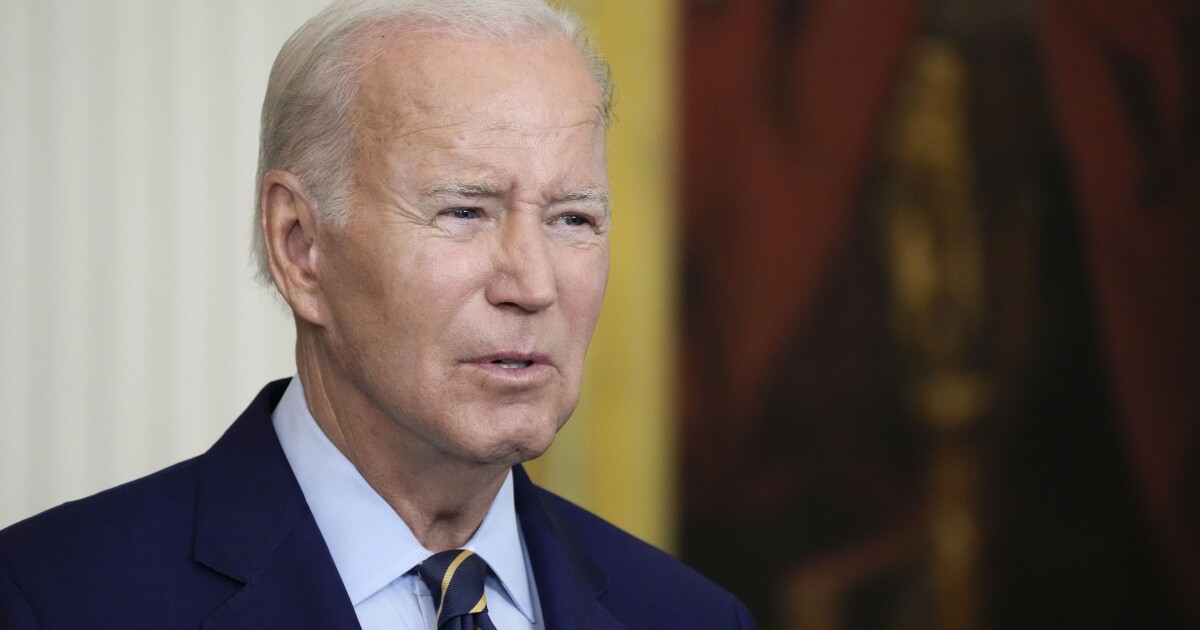

Next week is the anniversary of President Joe Biden and congressional Democrats, including Sen. Joe Manchin (D-WV), passing the Inflation Reduction Act.
Although inflation has cooled, consumer prices continue to be elevated.
HOW DEBATE CAN BE MAKE OR BREAK FOR CANDIDATES
But that is not stopping Biden and Democrats from promoting the measure before the release of last month’s inflation numbers as he prepares for next year’s general election.
Despite June’s annual inflation rate of 3%, a decrease from last June’s 9.1%, the Inflation Reduction Act has increased prices and exacerbated disinflation, or slower inflation, according to Heritage Foundation federal budget research fellow EJ Antoni.
“So the idea that the [Inflation Reduction Act] has been a smashing success because it has consistently brought down inflation, that won’t be the case on Thursday,” Antoni told the Washington Examiner. “The other thing is that inflation is still, if you’re going by June’s number, inflation is still more than twice what it was when Biden took office.”
Antoni, a public finance economist, said he would be surprised if last month’s annual inflation rate, which the Labor Department will report on Thursday, was below 3% since it has been trending toward 3% and not 2% “like we’ve been told it.” June’s monthly inflation was 0.2%, an increase from 0.1% in May. Core inflation, excluding food and energy prices, was 0.2% and 4.8% in June, an increase from 0.4% and 5.3% in May.
“There’s literally no indication that we’re going to be going any lower any time soon,” Antoni added. “I just ran the numbers again this morning, and I cannot make it come out any way other than higher than last month.”
Aside from “government spending, borrowing, and printing too much money,” Antoni pointed to energy prices amid the deprioritization of domestic production and how the average national cost of gas has increased to $3.83 a gallon from $3.50 a month ago, according to AAA.
The Republican National Committee has additionally amplified the increased cost of fuel, reminding Biden how he “wanted credit when gas prices fell from their peak” of $5 last June.
“Now, as prices soar once again, will Biden take responsibility? Doubtful,” RNC spokesman Jake Schneider said. “Since Biden took office, Americans have lost over $2,250 paying higher energy costs. Biden also drained the U.S. Strategic Petroleum Reserve down to just 18 days of supply — and refilling it will take decades.”
The economy will underpin Biden’s reelection campaign as the president and Democrats lose support among non-college-educated voters, including minority non-college-educated voters, partly due to his climate agenda. But it is a dynamic Biden and Democrats have contended with in the past, with exit polls from last year’s midterm cycle indicating the economy was the electorate’s top concern, along with abortion access, before the party outperformed expectations.
Simultaneously, with Biden’s average overall approval-disapproval rating at 42%-55% and his economic approval-disapproval at 38%-58%, the president’s inflation approval-disapproval is 33%-63%, according to RealClearPolitics. Those numbers were reflected in a Monmouth University poll last month that found his inflation approval-disapproval was 34%-62%, 26%-71% among independents.
“To the extent Americans may feel more confident financially, they aren’t giving Biden much credit for it,” Monmouth University Polling Institute Director Patrick Murray said. “His economic policy performance numbers have barely budged since last year.”
Biden will be in the battleground state of Arizona on Tuesday to underscore the Inflation Reduction Act before next Wednesday’s anniversary. There, the president will promote his “historic investments in conservation and protecting our natural resources” and the measure as “the largest investment in climate action in our nation’s history,” appeals to the Democratic base, according to the White House. He will then travel to New Mexico this Wednesday to tout the Inflation Reduction Act for “unleashing a clean energy manufacturing boom just one year after the law was signed,” the White House said. Biden’s preferred super PAC, Future Forward, is running new advertisements about the measure too.
Manchin could complicate the Inflation Reduction Act’s anniversary as he stokes speculation of a third-party presidential campaign instead of seeking reelection, likely against Gov. Jim Justice (R-WV).
CLICK HERE TO READ MORE FROM THE WASHINGTON EXAMINER
Manchin has criticized the Inflation Reduction Act’s electric vehicle tax credits for being expanded beyond commercial use and Biden’s broader domestic energy positions, though he did extract permitting reform concessions during last spring’s debt ceiling negotiations.
“The Inflation Reduction Act is one of the most historic pieces of legislation passed in decades, and we are already seeing real results in West Virginia,” the senator told the Washington Examiner. “While I have and will continue to fight the Biden Administration’s unrelenting efforts to manipulate the law to push their radical climate agenda at the expense of both our energy and fiscal security, I am also proud of the money it is saving hard-working families and the economic opportunities it is bringing to communities in West Virginia and across America.”





